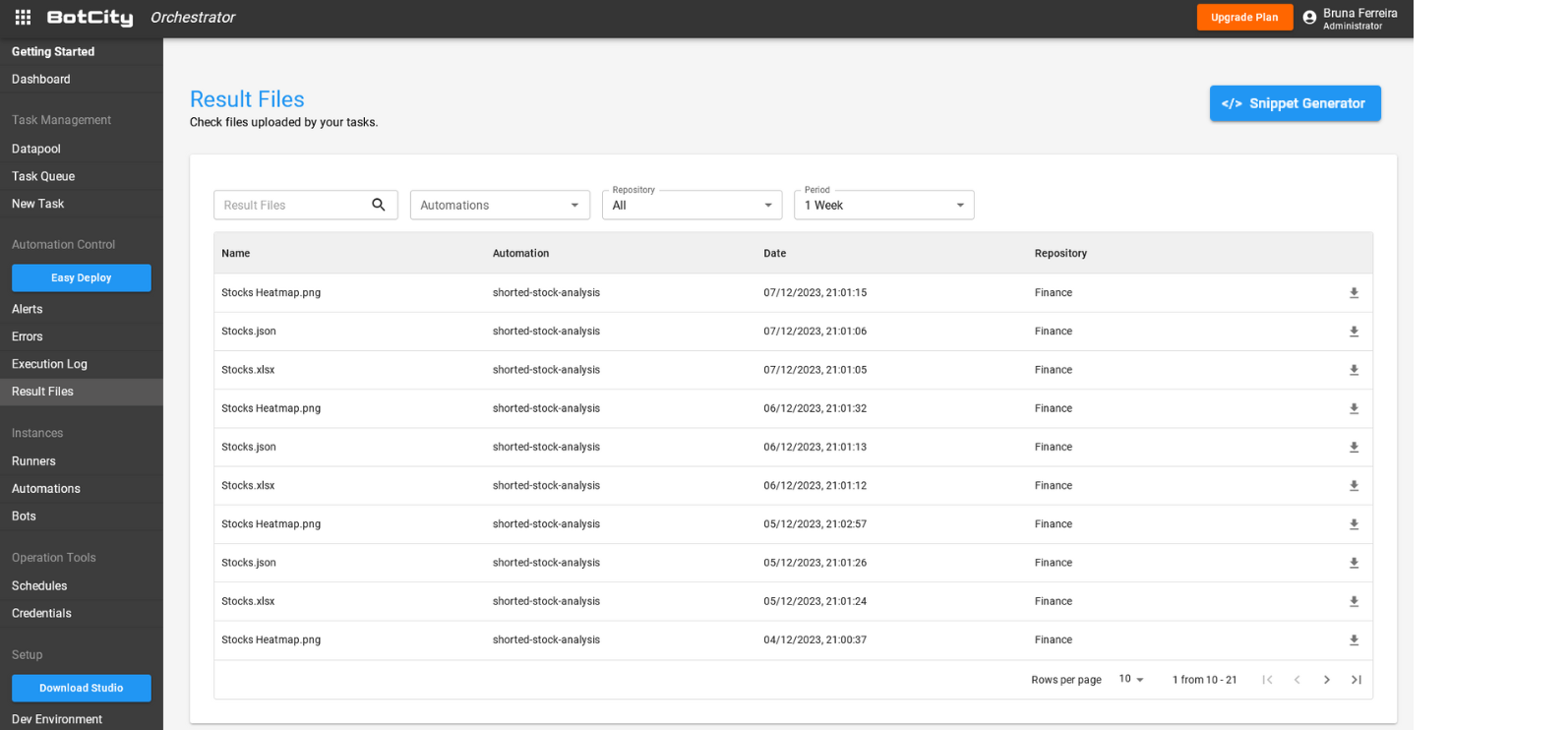Archivos de Resultado
Ir a Archivos de ResultadoUtilizando el SDK de BotCity Maestro, puedes cargar artefactos en el orquestador de BotCity Maestro para que estén disponibles para otros usuarios o aplicaciones a través del portal web o la API.
Llamamos a estos archivos artefactos porque son el resultado de la ejecución de una tarea y pueden ser cualquier tipo de archivo.
Tip
Explore  para ver ejemplos de código que facilitan la manipulación de archivos de resultados, acceder y aprender a enviar un artefacto, lista todos los artefactos y descargar un artefacto mediante código.
para ver ejemplos de código que facilitan la manipulación de archivos de resultados, acceder y aprender a enviar un artefacto, lista todos los artefactos y descargar un artefacto mediante código.
Los fragmentos generados están disponibles en los lenguajes Python, Java, JavaScript y TypeScript.
Cómo usar archivos de resultado con el SDK de Maestro¶
Puedes cargar fácilmente archivos de resultado en la plataforma utilizando el SDK de Maestro en tu código de automatización.
Instalación¶
Si aún no tienes instalada la dependencia, simplemente sigue estas instrucciones:
Important
Además de la instalación, recuerda incluir la dependencia en el archivo requirements.txt del bot.
<repositories>
<repository>
<id>nexus-botcity-public</id>
<url>https://devtools.botcity.dev:8081/repository/botcity-public/</url>
<releases>
<enabled>true</enabled>
</releases>
<snapshots>
<enabled>true</enabled>
</snapshots>
</repository>
</repositories>
<dependencies>
<!-- Your other dependencies -->
<dependency>
<groupId>dev.botcity</groupId>
<artifactId>maestro-sdk</artifactId>
<version>2.0.3</version>
</dependency>
</dependencies>
Importar el SDK¶
Después de la instalación, importa la dependencia e instancia el SDK de Maestro:
# Import for integration with BotCity Maestro SDK
from botcity.maestro import *
# Disable errors if we are not connected to Maestro
BotMaestroSDK.RAISE_NOT_CONNECTED = False
# Instantiating the Maestro SDK
maestro = BotMaestroSDK.from_sys_args()
# Fetching the details of the current task being executed
execution = maestro.get_execution()
// Import for integration with BotCity Maestro SDK
const { BotMaestroSdk } = require('@botcity/botcity-maestro-sdk')
// Getting parameters passed by Runner
const args = process.argv.slice(2)
const [server, taskid, token] = args
// Login with information from the Dev. Environment page
const maestro = new BotMaestroSdk()
maestro.login("YOUR_SERVER_HERE", "YOUR_USER_HERE", "YOUR_KEY_HERE")
// Fetching the details of the current task being executed
const executionTask = await maestro.getTask(taskid)
// Import for integration with BotCity Maestro SDK
import { BotMaestroSdk } from '@botcity/botcity-maestro-sdk'
// Getting parameters passed by Runner
const args = process.argv.slice(2)
const [server, taskid, token] = args
// Login with information from the Dev. Environment page
const maestro: BotMaestroSdk = new BotMaestroSdk()
maestro.login("YOUR_SERVER_HERE", "YOUR_USER_HERE", "YOUR_KEY_HERE")
// Fetching the details of the current task being executed
const executionTask: Task = await maestro.getTask(taskid)
// Import for integration with BotCity Maestro SDK
using Dev.BotCity;
using Dev.BotCity.MaestroSdk.Model.Execution;
// Instantiating the Maestro SDK
BotMaestroSDK maestro = BotMaestroSDK.FromSysArgs();
// Fetching the details of the current task being executed
Execution execution = await maestro.GetExecutionAsync(maestro.GetTaskId());
Cargar un archivo de resultado¶
Código completo¶
from botcity.core import DesktopBot
from botcity.maestro import *
# Disable errors if we are not connected to Maestro
BotMaestroSDK.RAISE_NOT_CONNECTED = False
def main():
maestro = BotMaestroSDK.from_sys_args()
execution = maestro.get_execution()
bot = DesktopBot()
# Take and save a screenshot in the path given
bot.save_screenshot("screenshot.png")
# Uploading a result file (artifact) to the Maestro
maestro.post_artifact(
task_id=execution.task_id,
artifact_name="My Artifact.png",
filepath="screenshot.png"
)
# Implement here your logic...
...
def not_found(label):
print(f"Element not found: {label}")
if __name__ == '__main__':
main()
import dev.botcity.framework.bot.DesktopBot;
import dev.botcity.maestro_sdk.BotExecutor;
import dev.botcity.maestro_sdk.BotMaestroSDK;
import dev.botcity.maestro_sdk.model.AlertType;
import dev.botcity.maestro_sdk.runner.BotExecution;
import dev.botcity.maestro_sdk.runner.RunnableAgent;
public class FirstBot extends DesktopBot implements RunnableAgent
{
public FirstBot() {
try {
setResourceClassLoader(this.getClass().getClassLoader());
} catch(Exception e) {
e.printStackTrace();
}
}
@Override
public void action(BotExecution botExecution) {
try {
BotMaestroSDK maestro = new BotMaestroSDK();
maestro.login(botExecution);
// Take and save a screenshot in the path given
saveScreenshot("screenshot.png");
// Uploading a result file (artifact) to the Maestro.
File artifact = new File("screenshot.png");
maestro.postArtifact(botExecution.getTaskId(), "My Artifact.png", artifact);
// Implement here your logic...
...
} catch(Exception e) {
e.printStackTrace();
}
}
private void notFound(String label) {
System.out.println("Element not found: "+label);
}
public static void main(String[] args) {
BotExecutor.run(new FirstBot(), args);
}
}
const main = async () => {
const { BotMaestroSdk } = require('@botcity/botcity-maestro-sdk')
const args = process.argv.slice(2)
const [server, taskid, token] = args
const maestro = new BotMaestroSdk()
maestro.login("YOUR_SERVER_HERE", "YOUR_USER_HERE", "YOUR_KEY_HERE")
const executionTask = await maestro.getTask(taskid)
const desktopBot = new DesktopBot()
// Take and save a screenshot in the path given
const filepath = await desktopBot.screenshot('/home/user/', 'screenshot.png')
// Uploading a result file (artifact) to the Maestro.
const artifact = await maestro.createArtifact(executionTask.id, "My Artifact.png", filepath)
main()
const main = async () => {
import { BotMaestroSdk } from '@botcity/botcity-maestro-sdk'
const args = process.argv.slice(2)
const [server, taskid, token] = args
const maestro: BotMaestroSdk = new BotMaestroSdk()
maestro.login("YOUR_SERVER_HERE", "YOUR_USER_HERE", "YOUR_KEY_HERE")
const executionTask: Task = await maestro.getTask(taskid)
const desktopBot = new DesktopBot()
// Take and save a screenshot in the path given
const filepath = await desktopBot.screenshot('/home/user/', 'screenshot.png')
// Uploading a result file (artifact) to the Maestro.
const artifact: Artifact = await maestro.createArtifact(executionTask.id, "My Artifact.png", filepath)
main()
using Dev.BotCity.MaestroSdk.Model.AutomationTask;
using Dev.BotCity.MaestroSdk.Model.Execution;
using System;
using System.Threading.Tasks;
namespace FirstBot
{
class Program
{
static async Task Main(string[] args)
{
BotMaestroSDK maestro = BotMaestroSDK.FromSysArgs();
Execution execution = await maestro.GetExecutionAsync(maestro.GetTaskId());
Console.WriteLine("Task ID is: " + execution.TaskId);
Console.WriteLine("Task Parameters are: " + string.Join(", ", execution.Parameters));
// Uploading a result file (artifact) to the Maestro.
await maestro.PostArtifactAsync(
execution.TaskId,
"My Artifact.png",
"screenshot.png"
);
// Implement here your logic...
}
}
}
Tip
Observa las otras operaciones que podemos realizar con archivos de resultado utilizando el SDK de BotCity Maestro y la API de BotCity Maestro.
